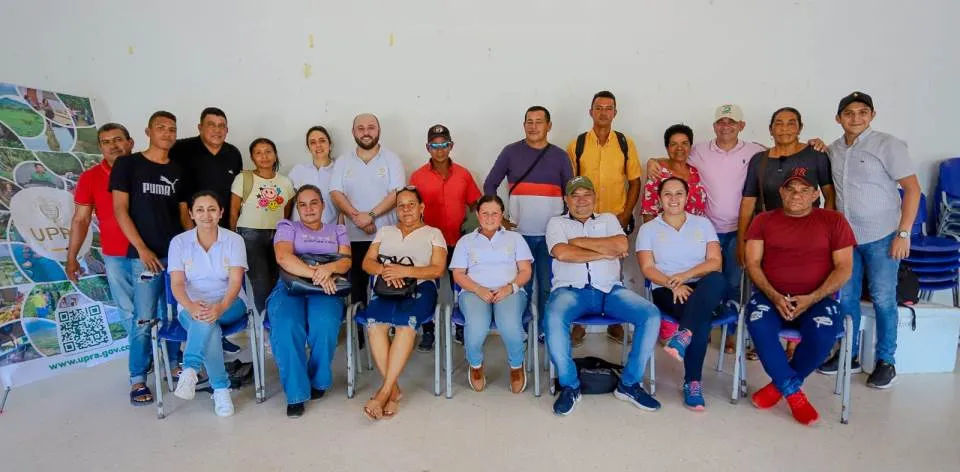PRESS ROOM
 24/7/2024
24/7/2024
We Continue Fulfilling Our Commitment to Peasant Reserve Zones: Claudia Cortés L.

This week, UPRA visits the Peasant Reserve Zone: Montes de María 2, Bolívar, stated Claudia Cortés, the director of the entity.
Colombia has established 14 territories as Peasant Reserve Zones; a planning tool that recognizes, protects, and promotes the peasant economy and the sustainable development of the territories. The House of Culture in Córdoba, Bolívar, was the meeting point for this first day of collective work for the agro-food territories.
Córdoba, Bolívar. (@UPRAColombia, @claudialili76). Located on the slopes of the Magdalena River is the Peasant Reserve Zone (ZRC) of Montes de María 2, comprising four municipalities in the Bolívar department, totaling more than 44,000 hectares. This week, these areas are participating in the Prioritization of Agricultural Productive Alternatives exercise, led by MinAgricultura and UPRA, with support from the association representing the peasants of the ZRC Montes de María 2.
Córdoba, Bolívar. (@UPRAColombia, @claudialili76). Located on the slopes of the Magdalena River is the Peasant Reserve Zone (ZRC) of Montes de María 2, comprising four municipalities in the Bolívar department, totaling more than 44,000 hectares. This week, these areas are participating in the Prioritization of Agricultural Productive Alternatives exercise, led by MinAgricultura and UPRA, with support from the association representing the peasants of the ZRC Montes de María 2.
"With peasants, representatives of associations, and leaders from the municipalities of Córdoba, El Guamo, San Juan Nepomuceno, and Zambrano in the Bolívar department, we are collaboratively advancing in selecting and prioritizing agricultural products identified from the analysis of the productive offer of their territory. This, combined with a market diagnosis, serves as a starting point for territorial planning of the ZRC Montes de María 2," stated Fidel Londoño Stipanovic, leader of the process at UPRA.
The director of UPRA explained: "The work of MinAgricultura and UPRA results from a genuine commitment to Colombia's 14 ZRCs; seven of which were declared by President Gustavo Petro's government. We work with the rural inhabitants of these territories to protect these zones, which are a product of the history of the colonization processes and the organization of peasants around food sovereignty and environmental conservation."
The ZRCs are defined as a planning tool that recognizes, protects, and promotes the peasant economy and the sustainable development of the territories.
Héctor Gazabón, leader and executive director of the ZRC Montes de María 2, said: "We were pleasantly surprised when UPRA and MinAgricultura contacted us to be part of this prioritization exercise. We have never done anything like this before, and we are an amphibious territory with an agricultural vocation that sees its future in the countryside. All of this will help us grow as a ZRC, have a productive guide, and plan our present and future, improving the quality of life for our families."
Aleyda Velásquez, an expert from the productive alternatives team at UPRA, stated: "With the participation of the municipalities of Córdoba and Zambrano, through a process of collective knowledge and participation, we prioritized the agricultural productive alternatives of the territory as a starting point for territorial planning and agricultural productive planning of the territory, with a long-term reach. We identified nearly 80 alternatives, including sesame, yam, corn, cassava, plantain, cattle, goats, and fishing, among others. We aim to prioritize those strategic for the market and the local population, ensuring the food sovereignty and security of the ZRC."
"In 2023, UPRA advanced with the prioritization of agricultural productive alternatives for the 32 departments; and, in 2024, we are committed to the ZRCs. We started with the ZRC Perla Amazónica in Puerto Asís, Putumayo, and now we are visiting Montes de María 2 in the Bolívar department," said Andrea Ramírez, an expert from UPRA.
To conclude, Andrea Cristina Herrera, from the UPRA team, detailed that this prioritization also included the "Productive Agromemories" exercise, which documents the agricultural and organizational memories of the ZRC, shaped by the communities' daily practices and their food security and sovereignty strategies.

